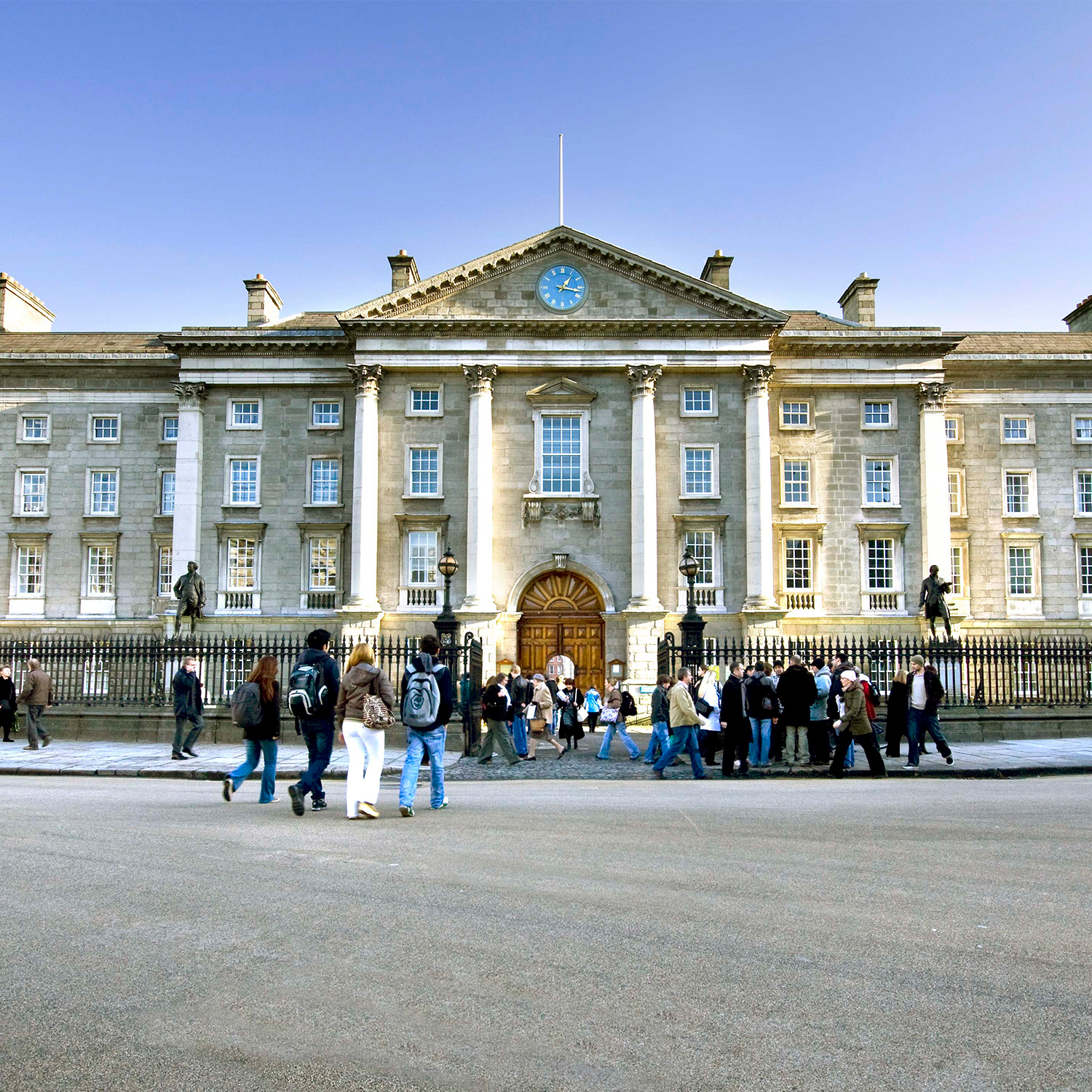Spain
Spain
Welcome to Trinity College Dublin, Ireland’s leading university. Prospective students from Spain can discover more about Trinity including contacts and equivalent entry qualifications for undergraduate and postgraduate study below. You can also register your interest to find out more.
Undergraduate Requirements
Trinity is delighted to accept students who have completed the below qualifications from Spain:
- Título de Bachiller
- Titulo de Bachillerato
Minimum Entry Requirements
6 distinct recognised subjects including 3 subjects grade 7 and 3 subjects grade 5 to include English, Mathematics and another language.
English Language Competence
Please list of acceptable English Language qualifications.
Specific Course Requirements
This table shows what is required in terms of the Spanish Examinations to meet specific course requirements. See the full details of specific course requirements.
Subject Grade Comparison: NB NOT for points conversion - for this see separate table below |
|||
LC Higher |
Spanish exam |
LC Ordinary |
Spanish Exam |
H1 |
10 |
O1 |
8 |
H2 |
10 |
O2 |
8 |
H3 |
9 |
O3 |
7 |
H4 |
9 |
O4 |
7 |
H5 |
8 |
O5 |
6 |
H6 |
8 |
O6 |
5 |
H7 |
7 |
||
Guideline Indicative equivalence with Irish Leaving Certificate points
The indicative equivalence will be calculated based on the average on the Titulo de Bachiller, assuming no repeat attempts are included, as follows:
Points Equivalence Table |
|
Average Título |
IPS |
10 |
600 |
9 |
555 |
8 |
526 |
7 |
493 |
6 |
395 |
5 |
285 |
Single Sitting
All subjects are examined at the same time and points are calculated based on a single sitting.
Bonus points for maths: Not applicable as there is no separate advanced level of Mathematics.
Note re Mathematics: Applied Mathematics in the Social Sciences group has a syllabus which is only accepted to meet ordinary level (O6) mathematics leaving certificate requirements.
Students who have not completed the above qualifications can apply using one of the international examinations recognized by Trinity.
Accepted qualifications for applications include:
In addition, to qualify for admission to a degree course at the University you must:
- Meet the minimum matriculation requirements (pass grades in English, Mathematics, a language other than English, and a full set of valid subjects for your examination system)
- Display a high level of competence in the English language in one of the examination systems recognised by Trinity College Dublin.
Details on accepted English proficiencies are available on our Admission Requirements page
- Satisfy course specific requirements. Some courses will have additional requirements and restrictions for admission.
They will be detailed on the relevant course page at and on our Admission Requirements page
- Meet competitive standards for admission to the course.
Please note that posted scores are minimum entrance requirements only and do not guarantee admission. Where places are competitive, a student must have excellent examination results to qualify for a place on their preferred course.
These standards are indicative only and final assessment will be made by Trinity's Academic Registry.
Important note on your application
Applicants from your country will normally be defined by Trinity as EU applicants; this is based on residency rather than nationality.
Your EU/Non-EU status is an important part of your application and it is your responsibility to determine your correct status before making an application, as the method of application and requirements will differ.
Determining EU/Non-EU status (Undergraduate)
Determining EU/Non-EU Status (Postgraduate)
There are many different ways to come to University and Trinity encourages applicants from all backgrounds and circumstances to apply. For more information on alternative paths to Trinity, such as advanced entry transfers,
please see our guide to non-standard applications here
Postgraduate Entry Requirements
Postgraduate work in Trinity is academically challenging and the University has high academic entry requirements.
Applicants will need to:
• hold at least a 2.1 honors degree from an Irish university or equivalent result from a university in another country.
Determining EU/Non-EU Status (Postgraduate) The fees you will be expected to pay to attend Trinity College Dublin are determined by a number of factors. For more information on how to determine your course fees, and methods of payment, please see our detailed information on Fees and Finances. Undergraduate Fees and Finances Postgraduate Fees and Finances For more information on scholarship, funding and grant opportunities, please see below. General Undergraduate Scholarships and Funding General Postgraduate Scholarships and Funding Do I need a Visa to come to Ireland to study at Trinity? Our EU Recruitment Team is here to help you find out more about Trinity College Dublin, through on campus Open Days, visits to Trinity with your school, assistance for your guidance counsellors and more.
For more information please see Visit Our Campus.
If you have further questions about the application process you can contact the Applications and Admissions Team in Trinity’s Academic Registry
Email: Academic Registry - AskTCD
Phone +353 1 896 4500
• display a high level of competence in the English language in one of the examination systems recognised by Trinity College Dublin. Details on accepted English proficiencies are available on our Admission Requirements page
Some courses may require higher standards or require you to take further tests or attend an interview. More detailed requirements for each course are listed on the relevant course page
If you have questions about the specifics of the admission requirements for a given course, or about the course itself, you should contract the course coordinator directly using the contact information available on the courses page.Fees, Funding, Scholarships
Trinity College Dublin offers a number of scholarship opportunities for prospective and current students interested in study or research at Ireland's leading university. Since its foundation in 1592, Trinity College Dublin has sought to assist students of limited means and reward academic achievement. Students are always encouraged to explore external funding options in their home countries.Visas
EU/EEA/UK/Swiss students do not require a visa to study in Ireland. If you are unsure about whether you are an EU/EAA national, see here for a list of all EU/EAA countries.
For general information on visas and immigration please visit our Visa Information section.
Meet us in your country
Contact Details
Contact us
Student Testimonials
-
 Ana Saint de MurietaTheoretical Physics
Ana Saint de MurietaTheoretical Physics
SpainSince I was around the age of 14, going abroad to university had been my dream. After some research I found this course that I wanted to study and told my parents I had to come if I got in. It was my dream course. Even then, I thought I had no chance of getting in, here I am and I haven’t regretted it a single time since coming here. Irish people have always been really welcoming so my experience is very positive. Even if there is obviously a culture shock, they don’t usually mind explaining whatever you don’t know and you’re soon treated as equal.
-
 Kevin MurphyMFA Stage Design
Kevin MurphyMFA Stage Design
IrelandI chose to undertake the MFA in Stage Design in order to further my creative practice, to spend a full year working on my design abilities and to develop the skills necessary to be a successful lighting designer after the course. It was great to have an established professional there to see how you work, give you feedback, and to see how your development over the course of the programme. I also really enjoyed that the MFA in Stage Design is primarily project-based which makes the course very practical and allows you to work on your skills in real time.





